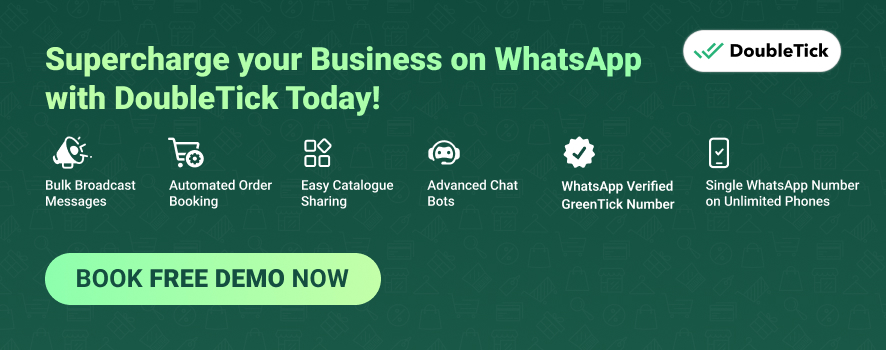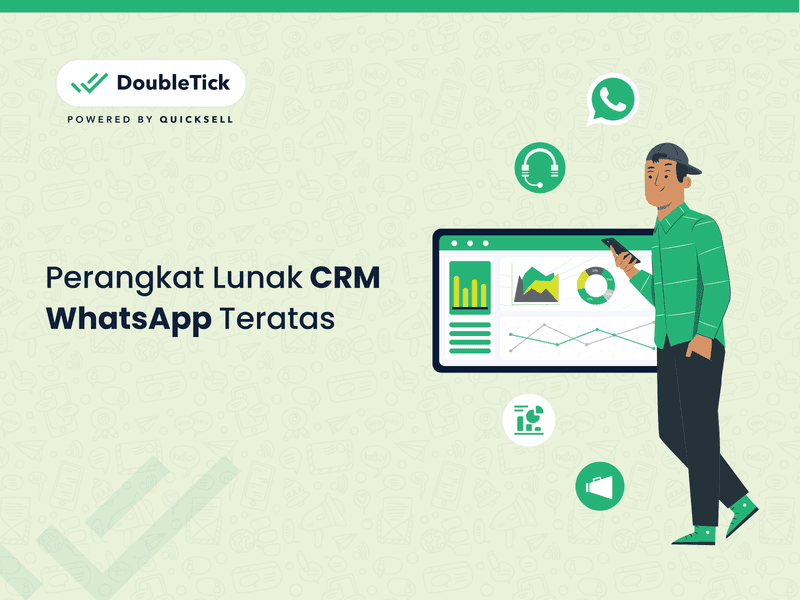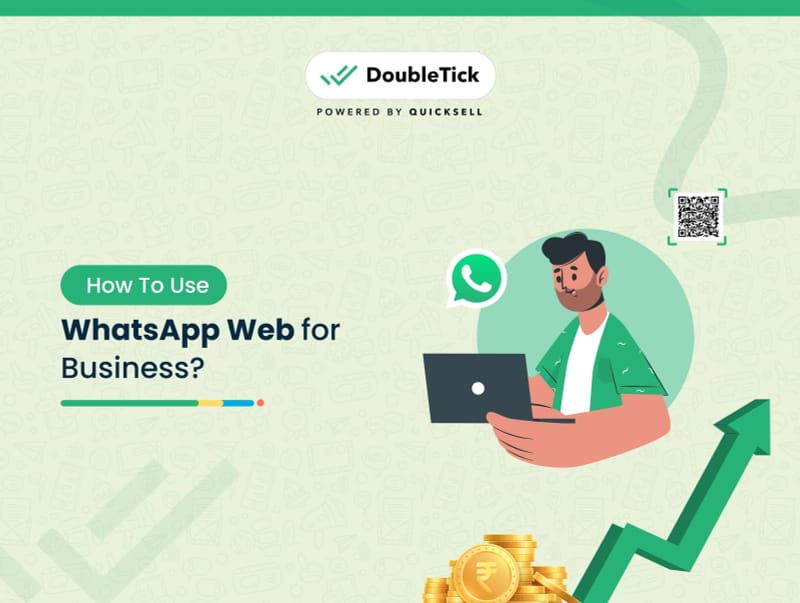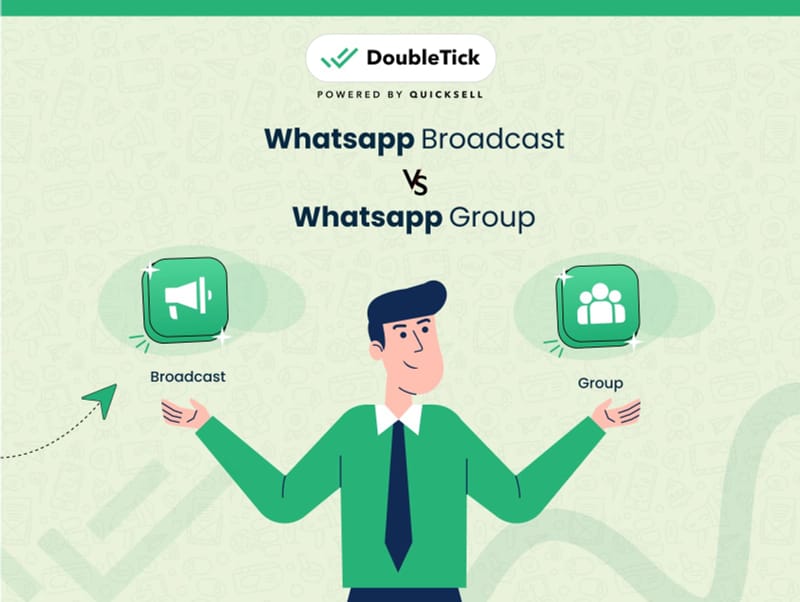.jpg)
Contents
- The Importance of Personalization for Businesses
- Optimizing WhatsApp Business API for Customized Experiences
- How to Personalize at Scale with WhatsApp Business API
- Common Challenges and Solutions for Personalization at Scale
- Maintaining Consistency Across Channels
- Ensuring Data Privacy and Security
- Overcoming Technical Limitations
- Best Practices for Personalization at Scale Using WhatsApp Business API
- Setting Clear Goals and Objectives
- Identifying Key Metrics for Measuring Success
- Consistently Monitoring and Analyzing Results
- Conclusion: Personalization at Scale with WhatsApp Business API Can Revolutionize Customer Experiences
- Frequently Asked Questions
The Importance of Personalization for Businesses
Personalization is crucial for businesses to thrive in today's market. The ability to tailor experiences to the needs and preferences of individual consumers increases customer satisfaction and builds brand loyalty. WhatsApp Business API, with its customized messaging options, allows businesses to communicate with customers in a personalized manner on a large scale.
By segmenting audiences and creating targeted messages, businesses can provide relevant solutions for each customer's unique needs. This increases the likelihood of conversions and enhances the overall customer experience.
Incorporating personalization into your business strategy can be an effective way to drive long-term success and growth. With WhatsApp Business API, businesses can leverage the power of customized communication at scale leading to better conversion rates, enhanced brand loyalty, and satisfied customers.
Wanna know about WhatsApp Business API in detail? Here is your 2023 Ultimate Guide to WhatsApp Business API - Click Here to Read
Optimizing WhatsApp Business API for Customized Experiences
To optimize your business experience on WhatsApp, understanding the WhatsApp Business API is the key. With this knowledge, you can personalize your interactions with your customers effectively. By doing so, you can deliver an array of benefits that come with personalization using the WhatsApp Business API.
Understanding the WhatsApp Business API
The WhatsApp Business API provides an opportunity for businesses to access valuable resources that enable them to engage their customers. A comprehensive understanding of this technology is essential for the proper optimization of customer experiences on the platform.
Benefits | Examples |
Automated messages | Order confirmations, delivery updates |
Inquiry management | Real-time responses to customer questions and complaints. |
Multimedia capabilities | Sending images, videos and voice notes increases engagement with customers. |
Using the API allows businesses to send automated messages that are tailored to specific scenarios such as order confirmations or delivery updates. In addition, through this service, companies can manage inquiries by providing real-time responses in an efficient manner. Multi-media aspects such as sending images, videos, and even voice notes can also be integrated into the conversation; this adds a more personalized touch which leads to increased customer engagement.
Benefits of Personalization Using WhatsApp Business API
Personalization using WhatsApp Business API can provide numerous benefits for businesses. By tailoring messages and experiences to specific customers, businesses can improve engagement, increase customer satisfaction, and drive sales.
- 1. Increased engagement: Personalized messages are more likely to be read and responded to by customers than generic messages.
- 2. Improved customer satisfaction: Customers are more likely to feel valued and understood when they receive personalized messages and experiences.
- 3. Higher conversion rates: Personalized recommendations and offers can persuade customers to make purchases or take other desired actions.
- 4. Enhanced brand loyalty: Personalization can foster positive relationships between businesses and their customers, leading to long-term loyalty.
In addition to these benefits, personalization using WhatsApp Business API enables businesses to provide real-time support and assistance to customers, increasing overall customer satisfaction.
How to Personalize at Scale with WhatsApp Business API
To personalize at scale with WhatsApp Business API, you need to create customized messaging, analyze user data, and integrate it with other tools. These sub-sections will help you understand the ways to optimize personalization for delivering customized experiences to your customers.
Creating Customized Messaging
When communicating with customers, it's important to speak to them in a way that's personalized to their individual needs. With WhatsApp Business API, businesses can create customized messaging at scale using dynamic templates and message tags. By segmenting their audience based on behavior and preferences, business owners have the opportunity to tailor their messages to the unique needs of each customer. This enhances the customer experience, leading to increased engagement and sales.
WhatsApp Business API allows businesses to send personalized messages in bulk, making it easier than ever before for companies of all sizes to communicate with their entire client base. This streamlined process can save time and resources while still providing a high level of personalized service. Along with dynamic templates and message tags, WhatsApp Business API also allows businesses to integrate chatbots into their messaging strategy. Chatbots can provide real-time support and assistance for common customer inquiries, freeing up valuable employee time.
Overall, customized messaging through WhatsApp Business API presents a powerful tool for enhancing customer communication and generating new leads for your business. By taking advantage of this technology, businesses can ensure that they stay ahead of the competition while creating a loyal customer base that will continue to return for years to come.
Analyzing User Data to Optimize Personalization
Analyzing user data is crucial to achieving optimized personalization on WhatsApp Business API. By evaluating and understanding the behavior and preferences of each individual user, businesses can tailor their communication and marketing strategies accordingly.
It's integral to gather as much information as possible about your target audience so that you can personalize messaging in ways that resonate with them individually. Businesses should employ various data analytical techniques like segmentation, open & click-through rates, and user feedback to gather insight.
By leveraging all that valuable information, businesses can craft effective personalized campaigns tailored to individual users while optimizing business goals. Analyzing user data lets businesses stay ahead of the curve by constantly improving communications while ensuring ongoing personalization. Reach out today to leverage WhatsApp Business API's potential fully! Why settle for just one tool in your marketing arsenal? With WhatsApp Business API, you can integrate with ease and dominate the competition.
Common Challenges and Solutions for Personalization at Scale
To optimize WhatsApp Business API for custom experiences, you need to overcome common challenges like maintaining consistency across channels, ensuring data privacy and security, and overcoming technical limitations. In this section, we’ll provide solutions to these challenges.
Maintaining Consistency Across Channels
Maintaining consistency across channels is crucial for personalization at scale. It ensures that the user experience is seamless and coherent, regardless of the platform or medium being used to engage with customers. One challenge is aligning messaging across channels, given their different functionalities and limitations.
A solution to maintain consistency could be using an agile approach to create content iteratively, which allows for quick adjustments without compromising the message. Another way would be to have a centralized customer data platform. Acting as a single source of truth for customer information, a composable CDP ensures personalized messaging remains consistent across all channels.
A critical step in achieving consistency is conducting regular audits of content and messaging across platforms. Building templates and style guides can help achieve brand consistency by setting standards around tone, voice, and visual style.
Ensuring Data Privacy and Security
Personalization at Scale requires ensuring data privacy and security. To prevent data breaches, companies must limit access to sensitive information, encrypt data in transit and at rest, and train employees on security protocols. Implementing Two-Factor Authentication (2FA) can also safeguard against unauthorized access.
A vital element of safeguarding consumer data is vital for building brand reputation and relationships. Companies that use artificial intelligence or machine learning should conduct regular model audits to ensure fairness.
Overcoming Technical Limitations
Personalization at scale requires overcoming technical limitations. A robust system must be put in place to achieve this. Providing customers with unique experiences across channels is challenging, but surmountable.
To overcome technical limitations, personalization needs to be guided by data that defines customer behavior. This way, businesses can better understand their target audience and provide tailor-made experiences that meet their needs. Such data allows for the development of automated personalization rules that aid in providing instant solutions.
When dealing with large amounts of data, it's essential to have streamlined processes that handle a significant amount of information efficiently. Machine learning algorithms are among the best solutions available today for processing vast amounts of data quickly and accurately.
Utilizing advanced marketing technologies is also crucial for scaling up personalized marketing initiatives. By employing tools such as AI-based chatbots or voice assistants, brands can engage with their customers individually on multiple communication channels simultaneously.
Best Practices for Personalization at Scale Using WhatsApp Business API
To optimize your WhatsApp Business API for customized experiences, follow these best practices for personalization at scale. Start by setting clear goals and objectives, identifying key metrics for measuring success, and consistently monitoring and analyzing results. These actions will allow you to understand your audience better and deliver tailored experiences that meet their needs.
Setting Clear Goals and Objectives
Goals and objectives are crucial in personalization at scale using WhatsApp Business API. Without setting clear goals and objectives, it's impossible to measure the success of your campaign and make necessary improvements. To set strong goals and objectives, start by considering your target audience. Who are they? What problems do they have? How can you solve those problems? Once you've got a clear understanding of your audience, think about what actions you want them to take. Do you want them to buy a product or sign up for a service? Whatever it is, be specific.
When setting your goals and objectives, it's important to make sure they're SMART: Specific, Measurable, Achievable, Relevant, and Time-bound. This will guide you in creating realistic goals that align with your business needs. Your goals should be specific enough to provide direction but not so narrow that they limit creativity.
Once you've set your goals and objectives, create a plan to achieve them. Break down each goal into smaller tasks and assign ownership of these tasks to team members who are most capable of executing them successfully. This way everyone is accountable for their part in achieving the overall objective.
One true history that illustrates the importance of setting clear goals comes from the early days of WhatsApp Business API. One company wanted to use WhatsApp as a customer service channel but didn't have clear goals or measures in place for determining success. As a result, they struggled to track how much time was being spent on customer inquiries versus other activities such as marketing promotions or social media management. To avoid this mistake, it's important to identify KPIs upfront so that success can be measured accurately from the start.
Finding the perfect metric for measuring success is like trying to find a needle in a haystack, except the haystack is on fire and you're allergic to hay.
Identifying Key Metrics for Measuring Success
When using WhatsApp Business API for personalization at scale, it is essential to identify key metrics for measuring success. This helps in assessing the performance of campaigns and improving future messaging strategies.
To measure success in WhatsApp Business API campaigns, several metrics should be considered. These include:- Message delivery rate- Message read rate- Response rate- Conversion rate
It is crucial to keep track of these metrics regularly and adjust messaging strategies accordingly to achieve optimal results.
To stay ahead in a highly competitive market, it is necessary to personalize marketing communication strategies. The success of personalization can be measured by identifying key metrics such as those discussed above.
A software company used personalized WhatsApp Business API messages to engage customers with exclusive product updates and releases.
Consistently Monitoring and Analyzing Results
Regularly track Key Performance Indicators (KPIs) such as open rates, response rates, conversion rates, and customer feedback.
Set up automatic reports to get real-time insights into performance trends.
Analyze data to understand what works and what doesn't and refine your personalized message strategy accordingly.
Identify segments that are underperforming and experiment with different personalized message variations while being mindful of the overall customer experience.
Aside from these practices, it's important to understand that consistent monitoring and analysis require investment in time, resources, and technology. Therefore, it's necessary to involve a dedicated team tasked with analyzing data from the WhatsApp Business API.
It's safe to say that neglecting the personalization of WhatsApp messages will likely lose your customers. To avoid losing customers or delaying timely stakeholder decisions because of poor results or lack thereof – then you need firm monitoring metrics you can depend on. Personalize smartly! Revolutionize your customer experiences by personalizing at scale with WhatsApp Business API - because no one likes feeling like just another number in a digital sea of sameness.
Conclusion: Personalization at Scale with WhatsApp Business API Can Revolutionize Customer Experiences
Personalizing customer experiences has always been a challenge for businesses, especially when catering to a large audience. However, with the WhatsApp Business API, personalization at scale is now possible. This revolutionary tool can help businesses customize their interactions with their customers - providing an exceptional experience that sets them apart.
Using the WhatsApp Business API allows businesses to tailor messages based on customer preferences and behavior, leading to better engagement and retention rates. The platform's features allow for automated responses and personalized one-on-one chats, making it easier for businesses to cater to various needs instantly in real time.
One unique aspect of the WhatsApp Business API is that it enables businesses to send relevant notifications, reminders, order updates, and delivery tracking information - all in one place! Furthermore, this allows customers to access information without the need for logging into separate websites or apps, which enhances user experience and increases brand loyalty.
Frequently Asked Questions
Q: What is personalization at scale on WhatsApp Business API?
A: Personalization at scale is the process of customizing customer experiences to make them more meaningful, using the WhatsApp Business API to automate and optimize the process.
Q: Why is personalization at scale important for businesses?
A: Personalization at scale enables businesses to provide a personalized experience to a large number of customers, resulting in higher engagement, satisfaction, and loyalty, which ultimately translates into increased revenue.
Q: How can businesses optimize the WhatsApp Business API for personalized experiences?
A: Businesses can optimize the WhatsApp Business API for personalized experiences by incorporating customer data, creating customized messaging flows, and automating conversations using chatbots, among other strategies.
Q: What are some benefits of personalization at scale?
A: Benefits of personalization at scale include increased engagement and conversion rates, reduced churn, improved customer satisfaction and loyalty, and enhanced brand reputation.
Q: Is personalization at scale only for larger businesses?
A: No, businesses of all sizes can benefit from personalization at scale, and the WhatsApp Business API offers a range of tools and features to support businesses of all sizes in achieving this goal.







